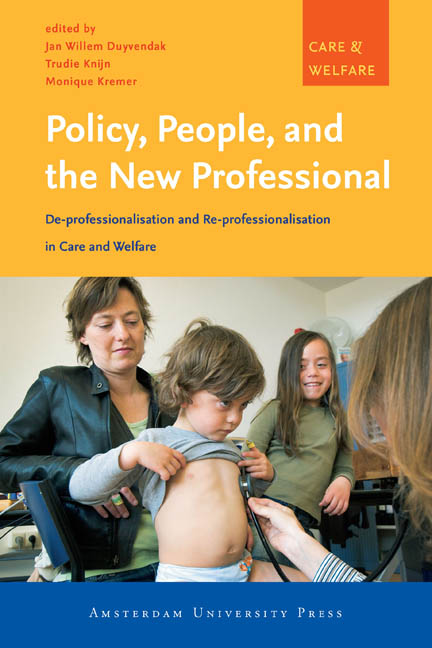 Policy, People, and the New Professional
Policy, People, and the New Professional 5 - When Ideologies Bounce Back: The Problematic Translation of Post-Multicultural Ideologies and Policies into Professional Practices
Published online by Cambridge University Press: 23 January 2021
Summary
Since the days (1917) that Calvinists and Catholics were allowed to manage their own schools with full funding by the central government, Dutch society has valued the relative autonomy of ethnic and religious groups. The accommodation of immigrant cultures and religions fits with this picture, so it is not surprising that many commentators have labelled the Netherlands a multicultural society (Favell 1998; Joppke 2004; Koopmans & Statham 2000; Koopmans et al. 2005; Soysal 1994; De Zwart 2005). However, developments in recent years have cast doubts upon this image of the Netherlands as a ‘multicultural paradise’ (Duyvendak et al. 2005; Uitermark 2005). It seems increasingly problematic to label Dutch policies as multicultural, but it would also be misleading to define them as assimilationist. Recent policies seem to combine the two extremes: The push for assimilation is probably stronger in the Netherlands than in many other countries, but at the same time it is clear that policies take into account migrant identities to quite a high degree. In order to solve this paradox, we need to unpack the notion of ‘multicultural society’.
In the Dutch debate about the multicultural society, it is striking that little distinction is made between the ethnic-cultural diversity in society as it is in practice, ‘multicultural’ government policy and multiculturalism as an ideal. Leading critics assume a strong link between the ideal of multiculturalism, the integration policy pursued until recently with respect to migrants, and actual practices at the local level (Scheffer 2000, Schnabel 2000, Van den Brink 2004). On the basis of their observations of unacceptable forms of segregation in cities and institutions, they quickly draw the conclusion that the ideal of cultural diversity is no longer satisfactory and should be replaced by alternative ideals such as ‘shared citizenship’ and ‘national cohesion’.
Historical research (Duyvendak & Rijkschroeff 2004; Fermin 1997; Prins 2000 [2004]; Rijkschroeff, Duyvendak & Pels 2004) has demonstrated that over the last decades, much of the integration policymaking has been driven by pragmatic considerations rather than principles. Moreover, one and the same policy instrument seems to have been applied over time for different reasons, either pragmatic or principle-related (Lucassen & Köbben 1992). To put it another way, policy does not have a one-to-one relationship with ideals; it is based on a variety of motives and justifications as well as principles, and cannot be reduced simply to the implementation of an ideal.
- Type
- Chapter
- Information
- Policy, People, and the New ProfessionalDe-professionalisation and Re-professionalisation in Care and Welfare, pp. 64 - 78Publisher: Amsterdam University PressPrint publication year: 2006
